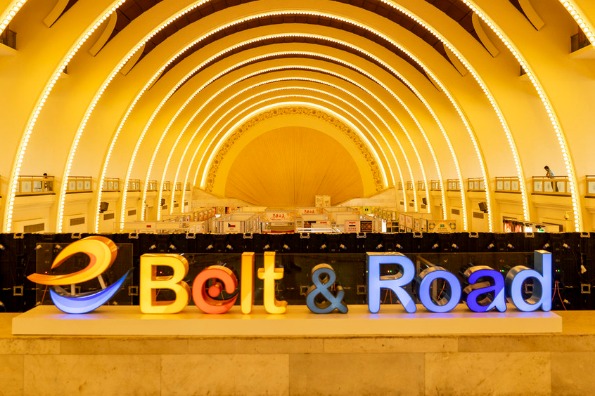
Researchers and executives see projects under the Belt and Road Initiative sprinting ahead despite the COVID-19 pandemic, as China advances green and inclusive development in the dual-circulation pattern.
Collaborative opportunities abound in realms from science and technology, cross-border logistics, to chemicals and education, according to experts attending the Fifth International Forum on the Belt and Road Initiative and Global Governance at Fudan University in Shanghai.
The Belt and Road Initiative has become an international platform widely accepted and deeply welcomed by the world, notably developing nations, thanks to its remarkable achievements in enhancing connectivity in infrastructure building, standard setting and people-to-people exchanges, said Yue Yanghua, chair of the China Center for Contemporary World Studies, International Department of the Central Committee of the Communist Party of China.
"The pandemic has propelled all countries to focus on infrastructure-building and investment in advancing global interconnectivity, which in turn has injected fresh vitality into the initiative," she said, identifying promising areas like digital economy, green development and vocational education.
Revisiting the concept of global public goods, Leslie Maasdorp, vice-president of the BRICS New Development Bank, said no country can tackle challenges like biodiversity, climate change or COVID-19 on its own.
"The only way for us to do this is to have multinational institutions that have the mandate and the legitimacy to pursue the agenda on our behalf," he said, referring to the likes of the Belt and Road Initiative in setting out standardized governance rules where every country's voice is heard.
As the next frontier in life sciences, human phenome cooperation holds high promise under the BRI framework, given economies related to this initiative have abundant diversity in population and phenotypes, said Jin Li, president of Fudan University and chief scientist of the Belt and Road Joint Research Center for Human Phenomics. The phenome is defined as the sum of the traits of an organism. It provides important clues to life sciences to enhance precise health management.
He called on the university to continue research on the human phenome, public health and climate change, strengthen interdisciplinary research, boost cooperation in education, and foster related science and technology organizations among BRI economies.
Amidst the pandemic, the China-Europe railway running across BRI regions has played a pivotal role in ensuring economic and trade exchanges and the transportation of anti-pandemic goods, said Li Jianya, vice-president of the Hong Kong Chinese Industry and Commerce Association.
"Notably, we forecast exponential surge in the export of China's new energy cars via the China-Europe Railway," Li said. He proposed enhancing supporting measures on the ground, promoting high-tech logistics applications, and better coordinating multiple Chinese cities in joint outbound transportation.
Pang Guanglian, executive board member of the China Petroleum and Chemical Industry Federation, said Chinese chemical companies are advancing major projects in BRI regions in a green manner, like helping oil exporting nations such as Saudi Arabia, Russia and Kuwait with sustainable practices, and realized waste water recycling in some Egypt-based projects.
China has proposed high-quality Belt and Road cooperation since the initiative was introduced in 2013. According to a report from the World Bank, BRI transport projects could by 2030 help lift 7.6 million people out of extreme poverty and 32 million people out of moderate poverty globally.






